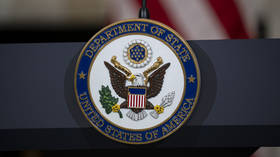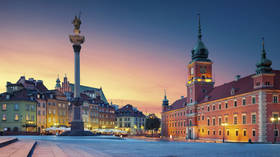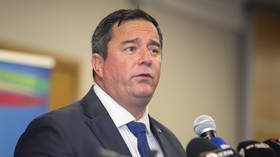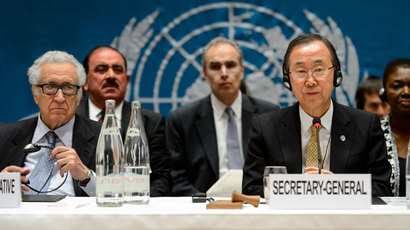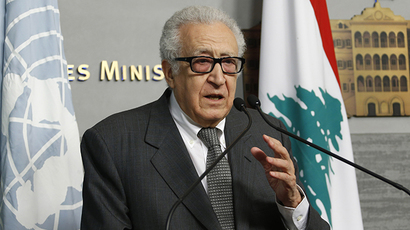Syria peace talks unravel after 'US military aid' accusations
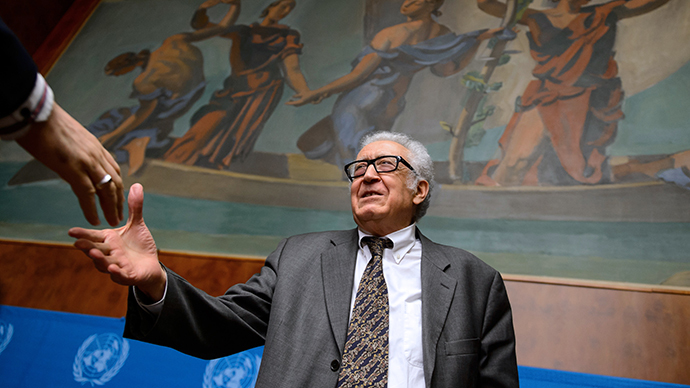
The fourth day of the Geneva 2 peace negotiations has been halted earlier than scheduled following a fierce exchange of accusations from both the opposition and the Syrian government over the alleged resumption of US military aid to the rebels.
The talks were cut short by the UN-Arab League mediator Lakhdar
Brahimi following the morning session when the opposition
delegation rejected an official complaint note presented by the
Syrian government delegation criticizing the resumption of US
aid.
“We believe this is not the best present to the Geneva
conference,” said Faisal al-Mikdad, Syria’s deputy foreign
minister, calling the American decision “another
manifestation” of US support for “terrorist groups” in
Syria.
“This proves again that the United States is not interested
in the success of this process, and we believe the US has to
desist and stop its claims that it is interested in the success
of this conference,” he told reporters following the
meeting.
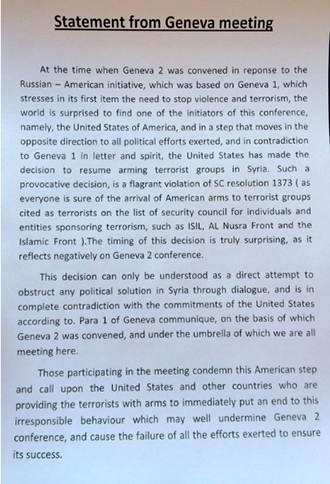
On Monday, Reuters reported that “moderate” Syrian rebel
factions are being armed by the United States after the US
Congress secretly approved the measures. Weapons which
allegedly reach Syria via Jordan include a variety of small arms,
and are believed to include anti-tank rockets and
shoulder-launched surface-to-air missiles.
On Monday, the US rejected arming the rebels, saying that
“any notion that we support terrorists is ludicrous.”
“The Assad regime is a magnet for terrorists,” US State
Department spokesman Edgar Vasquez said in a statement. “The
regime’s brutality is the source of the violent extremism in
Syria today. We support the moderate political and military
opposition who are fighting for the freedom and dignity of all
the Syrian people.”
Instead, Vasquez blamed the Assad government of undermining the
talks, saying the document “shows that the regime is evading
the core purpose of the Geneva talks.”
The UN refused to comment on reports of the decision by the US
Congress to approve the delivery of small arms to Syrian
opposition, but Brahimi told the Itar-Tass news agency that he
had not seen an official statement on the issue by Washington.
In the meantime, Russian Foreign Minister, Sergey Lavrov said
that arming the opposition translates into arming terrorists.
“New supplies of lethal and non-lethal weapons to the Syrian
conflict area lay groundwork for supporting terrorists,”
Lavrov told journalists in Brussels on Tuesday where
Russia-European Union summit was being held.
Tuesday’s talks were supposed to focus on the transfer of power
and providing aid to the city of Homs, but there was no progress
toward resolving the key issue of whether President Bashar Assad
should step down and transfer power to a transitional government.
Negotiations are to reconvene on Wednesday, Lakhdar Brahimi, the
chief UN mediator, told reporters, as he hopes for a “better
session.”
“Nobody is walking out,” Brahimi said, “Nobody is
running away.”
“We have not achieved any breakthrough, but we are still at
it, and this is good enough as far as I'm concerned,”
Brahimi said.
A member of the opposition negotiating team, Rima Fleihan, said
that UN mediator Lakhdar Brahimi had cancelled the afternoon
session “because the regime is not cooperating on any
subject, not on humanitarian issues and not on a transitional
governing body.”
She said the government’s representatives rejected the
opposition’s “vision” for Syria. “We have a vision,
unfortunately the regime presented nothing and refused all
discussion.”
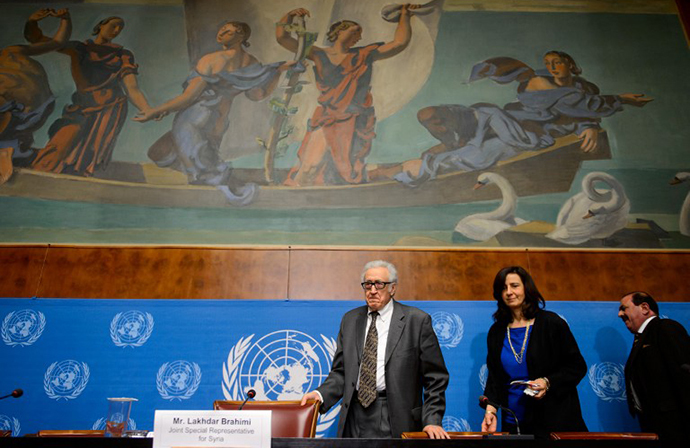
Moscow in the meantime wants to avoid “another obsession with
regime change because of somebody’s personal animosity, personal
hatred to a particular individual,” Lavrov said in Brussels.
“Imagine Assad disappears. Who is going to keep it together?
There is no answer,” Lavrov said, adding that the
“adoption of a declaration on principles of the Syrian
state's existence should be the next step in the inter-Syrian
dialogue.”
On Monday, the government’s team presented a working paper on
Syria’s future, which Murhaf Joueijati, a member of the
opposition Syrian National Coalition’s negotiating team, said was
rejected by the opposition because it “had nothing to do with
a transitional government,” and was instead focused on the
need to combat terrorism and cease funding and arming of rebel
groups.
The governor of Homs province said on Tuesday that UN officials
are trying to negotiate with opposition fighters to allow the
evacuation of civilians, as security concerns and al-Qaeda linked
cells hinder the operation. At the same time, Joueijati accused
the government of not allowing the delivery of humanitarian aid
to Homs, which has been under siege for almost two years.
Syria’s deputy foreign minister, Al-Mikdad denied the
government’s role in delaying the delivery of aid, saying that
Damascus needs “assurances that the aid will not go to armed
and terrorist groups in the city.”
In the meantime, Elisabeth Byrs, a spokeswoman for the World Food
Program, confirmed that aid vehicles are on standby.
“We need that all security conditions be met to allow this
interagency convoy to go,” said Byrs.




